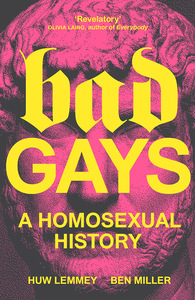You need to sign in or sign up before continuing.
Take a photo of a barcode or cover
Hugely enjoyed. Helpful tidbits:
Introduction
Charles King re: Andrew Sullivan declaring AIDS over in the New York Times:
Introduction
Sexologists described a 'third sex' somewhere between male and female. In cities thronging with the new proletarian masses and enriched by colonial plunder, a group of people became the first generation of activists pursuing something we might recognize as 'gay rights.'
Bosie was hardly the first gay to...confuse liberation with the freedom to live out his own desires and elevated class status.
The failure, however, of mainstream, actually existing white male homosexuality to enact liberation and its embrace instead of full integration into the burning house of the couple-form, the family unit, and what we might hopefully call late-stage capitalism is real, and it is arranged on three primary axes: first, its seperation from and fear of gender non-conformity; second, its simultaneous appropriation of the bodies and sexualities of racialized people and denial of those people's full humanity, political participation, and equality; and third, its incessant focus on the bourgeois project of 'sexuality' itself.
...homosexuality's project of self-justification has often depended on claiming normalcy at the expense of a gender non-conforming Other...the bodies of racialized and colonized people and ideas about their social organization have served as the literal substance of white metropolitan homosexual and transgender subjectivities and identities.
But identities are, as Stryker has said, 'where the rubber of larger social and cultural systems hits the road of lived experience.'
The rigid segmentation of time into separated zones of work and leisure, along with moral panics about 'backwards' people intended to justify colonial expansion and incursions into the supposedly immoral private lives of the working classes, inculcated the idea that who you fucked made you who you were.
Unlike today, when sodomy means anal sex, for the most of the mediaeval period it simply referred to sexual acts which would not or could not result in procreation...The reason, therefore, for the prohibition of sodomy was that it was unnatural, against God's plan for mankind to 'be fruitful and multiply'.
Around the 1300s the Italian city-states began to implement the fist civil laws against such behavior, in the early fourteenth century Philip of France realised how useful the accusation of sodomy could be in repressing the powerful Knights Templar, to whom he owed a large sum of money he could not pay back.
The presence of people whom colonists could call sodomites and cross-dressers provided a useful religious and political justification for their murder and subjugation.
As colonialism and race science were beginning to create taxonomies of humans based on traits and behaviors, sex theorists began to conceptualise into life a new type of human — the homosexual.Hadrian
The Roman ambivalence, that the Greeks wre both wise and decadent, worthy of study but worth being wary of, rang down through history, and has had significant impact on the history of homosexuality...Across Greece, sexual activity between men was common; the important prohibitions were not focused on gender but status (and hence age).Pietro Aretino
For Luther, it wasn't just the indulgences; it was also the man-on-man action that symbolised the collapse of the Roman Church's authority.
Silvia Federici argues that the witch hunts were an integral part of the restructuring of social relations in the early modern period, when a new phase in capitalist development required a new patriarchal order...'conquest, enslavement, robbery, murder, in short, force play[ed] the greatest part.' These forms of brutality created a degree of wealth, and a degree of landless impoverishment on the part of ordinary people, which enabled that wealth (invested in industry) and the labour of the poor to come together to produce the capitalist order.Frederick the Great
The increasing movement of people off the land and into cities created new living arrangements and classes of people, urban dwellers with disposable income and the ability to make their own lives. This only increased the amount of same-sex erotic and romantic contact, much of which happened on dangerous and difficult-to-control streets and in the new spaces created by mass urban life. Sexologists and psychiatrists, newly empowered with the method and mission to peer into the souls of teh masses and try to make them better and more productive workers — and to reproduce the next generation in highly policed nuclear families — began to transform these rebels against the sexual order into a class of being: the homosexual.Jack Saul
It's not for nothing that even today, working class men who do not 'present' as homosexual, yet are still open for sexual encounters with upper- and middle-class men are, whether or not money is actually exchanged, often known as 'trade', a usage that came to be in the 1870s. While inverts were a subject for treatment, sympathy, and even poetry, perverts could expect little more than for the long arm of the law to feel them up.Roger Casement
The invention and patenting of the tire by John Dunlop in 1887 and Edouard Michelin in 1891 increased the demand for rubber for bicycle and, eventually, automobile tires. To meet this demand, by decree, the Congo Free State dictated that any land without a house or cultivated garden was the property of the state. Leopold then allocated the land, rich in natural resources and particularly rubber, to private companies as concessions. In this way the commons of the people of the Congo were stolen and converted into private European property.Margaret Mead
Domestic rebels against bourgeois European sex-gender systems looked to colonial subjects, whose sex-gender systems were being burlesqued and misrepresented by Western ethnographers as part of the project of colonization, for examples of how same-sex desire and eroticism had been integrated into community life.Philip Johnson
Within classes, races, and sexualities there exist multitudes of difference; and the ways in which that difference accumulates, and the relative importance people so grouped give to those kinds of difference, and how outsiders understand those differences as we create narratives about them makes all the difference in how we understand our present and past.Pim Fortuyn
Charles King re: Andrew Sullivan declaring AIDS over in the New York Times:
You can almost see the mark of that article and sort of the handoff: this is no longer our problem. We're going to move on to gay marriage and other things that pull us in towards the center, with the presumption that everybody wants to be in the center instead of at the margins.
This brutal inequality underlay what Shepard called 'the queer/gay assimilationist split,' in which those who could afford and have access to AIDS treatment in the Global North developed a different kind of gay politics, one focused on integration into middle- and ruling-class life and the enabling of the seamless generational transfer of property and wealth. If gay liberationists had organized against the draft, 'gay rights' groups petitioned for the right to fight in the military. If lesbian separatists had inveighed against the brutality and misogyny of the institution of marriage, 'gay and lesbian rights' groups suddenly proposed that marriage was the ultimate sanctifying act needed to make their love meaningful.
AIDS had, in addition to killing and/or burning out large swaths of two generations of queer activists and community leaders, made a powerful argument to many gays and lesbians that normalcy and integration into state institutions might not be such a bad thing, after all.
challenging
informative
medium-paced
I enjoyed the book but I felt the overarching theory could have been more powerful
challenging
dark
hopeful
informative
slow-paced
dark
emotional
funny
informative
tense
medium-paced
Having LGBTQ+ heroes and role models is important, but what about the messy, villainous or complicated queer folk of history? That premise drew me in, and won my delight with prose like, "But was Hadrian's affection and love for Antinous purely paternalistic or platonic, an admiration of his youth and beauty? Put simply: did they fuck?" With language like that, it's not surprising that this book began life as a podcast, but the conversational style is part of what makes this a good casual read. For the more serious minded reader, the frequent focus on how white, cis gay men use and abuse their privilege is well put and useful.
informative
reflective
slow-paced
slow-paced
It was fine, I enjoyed learning about prominent queer figures throughout history (some worse than others). It just felt like it dragged a little bit at points and there were a lot of side tangents in the stories that I wasn’t a huge fan of.
“Ultimately, this book is a project of demystification - and an act of love. ‘Gay is Good’ went the old slogan, but it’s no good at all on its own. As you will see, many of the queers with the very worst political goals have wanted to position themselves as heirs to a secret or magical kingdom, as the sons of a long line of heroes. The process of making the movement and the identity has often involved reifying, recreating, and worshipping power and evil in their most brute forms. Maybe it is time that homosexuality itself dies, that we find new or more functional and more appropriate configurations for our politics and desires. Or maybe being queer is just as transitory and incomplete as anything else. Maybe all of us are lost and scared, subject to forces beyond our control and trying to figure out how to configure out unruly desires and our politics into an ethical way of being in the world. If there is anything of homosexuality to be saved, it is its reconstruction of the concept of the family. Not born into fixed kin, we get to choose ours. This can be a project of socialization, but also of politicization, of understanding to which kind of political ‘we’ we wish to belong. Understanding how we became a ‘we’ in the first place, and interrogating the extent to which that ’we’ even makes sense, given how different ‘we’ have been from one another and how terribly ‘we’ have often been treated by one another, might help more of us choose better. Then, the real work begins.”
Really thought provoking
Really thought provoking
medium-paced
Meticulously researched and presented in a nuanced way. I enjoy how a lot of the book is compromised of meditations on what it is to be “bad” and what it is to be “gay,” both of which, like everything else, are historically constructed. Also, really intriguing argumentation about the ways in which sexual identity, gender identity, race, and socioeconomic class interact to create those historical conceptions of both badness and gayness.




